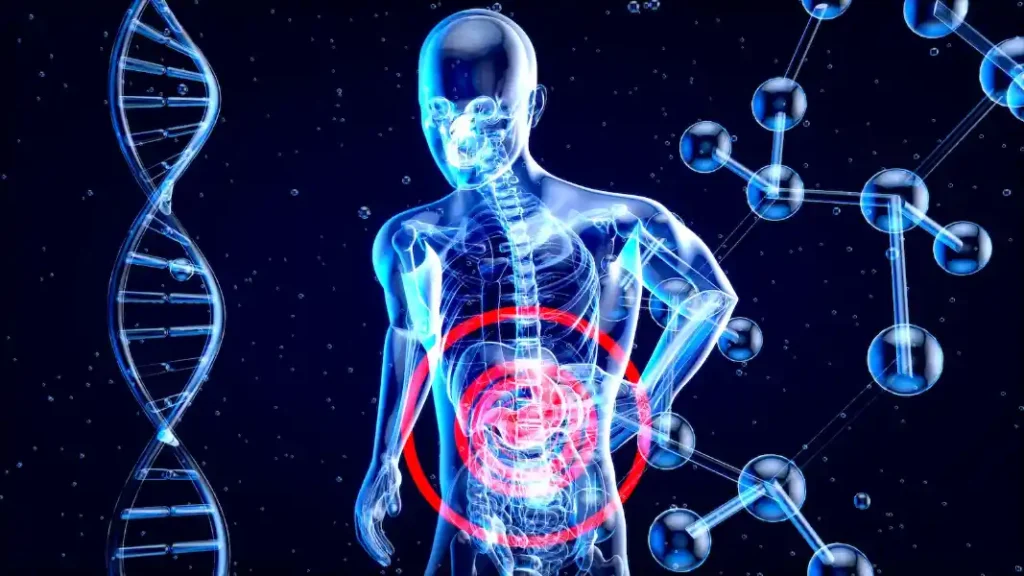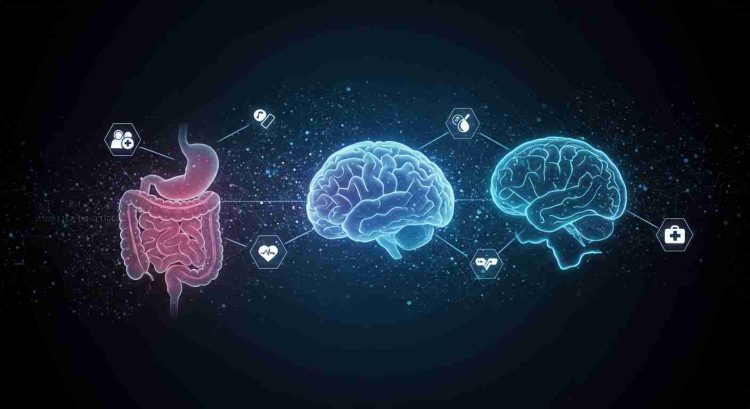In recent years, science has begun to affirm something ancient cultures long suspected: the gut is more than just a food-processing organ. It’s a complex, intelligent system that plays a central role in how we feel, think, and even perceive the world. This intricate relationship between our digestive system and our mental health is referred to as the gut-brain connection. It’s a dynamic, bi-directional communication system that links the emotional and cognitive centers of the brain with intestinal function. But how exactly does your gut influence your thoughts, and what dietary choices can help optimize both digestion and mental clarity?
This article unpacks the science behind the gut-brain axis and offers actionable strategies for using food to nourish not just your body, but your mind.
The Gut-Brain Connection: More Than Just a Feeling
When we talk about “gut instinct” or feeling “butterflies” before a big event, we’re tapping into the real, physiological links between the digestive system and the brain. The gut and brain are connected via the vagus nerve, one of the largest nerves in the body, which carries signals in both directions. In fact, about 90% of the vagus nerve’s transmissions go from the gut to the brain—not the other way around.
The gut is also home to the enteric nervous system, often dubbed the “second brain.” This network of neurons embedded in the gut wall regulates digestion independently of the brain and contains more neurons than the spinal cord. It communicates constantly with the central nervous system, influencing mood, cognition, and mental performance.
But perhaps the most fascinating player in this relationship is the gut microbiome—the trillions of bacteria, fungi, and other microbes that inhabit the digestive tract. These microorganisms don’t just help digest food; they produce neurotransmitters like serotonin, dopamine, and GABA, which regulate mood and mental clarity. Roughly 90% of serotonin, for example, is produced in the gut.
How a Healthy Gut Supports a Clear Mind
When your gut is functioning optimally, it sends positive signals to the brain that can improve mood, reduce anxiety, and enhance focus. A healthy digestive system ensures that nutrients are properly absorbed, neurotransmitter production is balanced, and inflammation is kept in check.
Conversely, an unhealthy gut can wreak havoc on mental clarity. Poor digestion, bloating, dysbiosis (microbial imbalance), and leaky gut syndrome can all contribute to brain fog, fatigue, irritability, and even symptoms of depression and anxiety. Chronic gut inflammation can stimulate the release of cytokines—chemical messengers that cross the blood-brain barrier and trigger inflammatory responses in the brain.
Research continues to draw connections between digestive health and neurological conditions. Studies have shown that people with irritable bowel syndrome (IBS) are significantly more likely to suffer from anxiety and depression. Similarly, people with clinical depression often exhibit signs of dysbiosis or gut inflammation.
Signs Your Gut May Be Impacting Your Mind
Understanding the signs of gut-related cognitive dysfunction can help you make more informed dietary and lifestyle decisions. Common symptoms include:
- Frequent bloating or gas
- Irregular bowel movements
- Brain fog or difficulty concentrating
- Mood swings or unexplained irritability
- Anxiety or depressive symptoms
- Food sensitivities or intolerances
- Fatigue after eating
If these issues persist, it may be time to look beyond the brain and examine what’s happening in your gut.
Dietary Adjustments to Support Gut and Mental Health
What you eat directly shapes the health of your gut microbiome, and in turn, your mental state. Here are key dietary strategies to optimize both digestive and cognitive wellness:
1. Increase Prebiotic Fiber Intake
Prebiotics are non-digestible fibers that feed your gut’s good bacteria. They help maintain microbial diversity and stimulate the production of short-chain fatty acids like butyrate, which support gut lining integrity and reduce inflammation.
Top prebiotic-rich foods:
- Garlic
- Onions
- Leeks
- Asparagus
- Bananas
- Oats
- Chicory root
2. Eat More Fermented Foods
Fermented foods contain live cultures of beneficial bacteria, or probiotics, which help populate and balance the gut microbiome.
Try incorporating:
- Yogurt with live cultures
- Kefir
- Kimchi
- Sauerkraut
- Miso
- Tempeh
- Kombucha
3. Prioritize Omega-3 Fats
Omega-3 fatty acids, especially EPA and DHA found in fish, reduce gut inflammation and promote neurotransmitter regulation. They are vital for both gut and brain function.
Omega-3 sources:
- Salmon
- Mackerel
- Sardines
- Chia seeds
- Flaxseeds
- Walnuts

4. Reduce Sugar and Processed Foods
Excess sugar and ultra-processed foods feed harmful gut bacteria and yeast, promoting imbalance and inflammation. This can lead to dysbiosis, which negatively impacts neurotransmitter production and mood.
Focus on whole, unprocessed foods and natural sweeteners like honey or fruit.
5. Stay Hydrated
Adequate water intake supports digestion, nutrient transport, and gut motility. Dehydration can slow digestion, contribute to constipation, and affect focus and mood.
Aim for at least 8 cups (2 liters) of water daily, more if you’re active or live in a hot climate.
6. Practice Mindful Eating
The gut and brain communicate most effectively when you’re relaxed. Stress during meals can disrupt digestion and nutrient absorption.
To eat more mindfully:
- Avoid screens or distractions during meals
- Chew food thoroughly
- Take deep breaths before eating
- Eat slowly and stop when 80% full
7. Consider a Gut-Health Reset Diet
Elimination diets like low FODMAP, Whole30, or autoimmune protocols can help identify gut irritants and reset your microbiome. These diets are typically followed short-term under the guidance of a healthcare professional.
Supplements That May Support the Gut-Brain Axis
While food should always come first, certain supplements can provide targeted support for gut and mental health:
- Probiotics: Choose multi-strain formulas that include Lactobacillus and Bifidobacterium strains.
- Prebiotic fibers: Like inulin or partially hydrolyzed guar gum.
- L-glutamine: Helps repair the gut lining.
- Digestive enzymes: Aid in breaking down food to improve nutrient absorption.
- Magnesium: Supports both gut motility and nervous system regulation.
- Vitamin D: Deficiency is linked to both gut dysbiosis and mood disorders.
Always consult a healthcare professional before adding new supplements to your routine.
Lifestyle Habits That Boost Gut and Brain Health
Diet is only part of the gut-brain equation. Several lifestyle factors also influence this delicate relationship:
1. Stress Management
Chronic stress disrupts gut motility and increases intestinal permeability (leaky gut). Practices like meditation, breathwork, yoga, and journaling can calm the nervous system and promote digestive balance.
2. Quality Sleep
Sleep is when your body performs essential gut repair functions. Aim for 7–9 hours of quality sleep per night, and maintain a consistent bedtime routine.
3. Regular Movement
Exercise increases microbial diversity and stimulates the release of endorphins, improving both digestion and mood. A brisk 30-minute walk daily can make a significant difference.
4. Limiting Antibiotics
Antibiotics wipe out beneficial gut bacteria alongside harmful ones. Only take them when necessary and follow up with probiotics and fermented foods to help your microbiome recover.
5. Spend Time in Nature
Exposure to diverse microbes in natural environments can positively influence your microbiome. Gardening, hiking, or even outdoor picnics can benefit gut health.
Building a Gut-Friendly Daily Eating Routine
A gut-friendly day of eating doesn’t need to be complicated. Here’s a sample day to help inspire your meal planning:
Breakfast:
- Greek yogurt with chia seeds, berries, and honey
- Green tea
Lunch:
- Quinoa bowl with roasted sweet potatoes, sautéed kale, tahini dressing, and pumpkin seeds
Snack:
- Apple slices with almond butter
- Kombucha
Dinner:
- Grilled salmon with steamed broccoli, wild rice, and a squeeze of lemon
- Chamomile tea before bed
Dessert (optional):
- A square of dark chocolate (70%+) with a handful of walnuts
Reframing Mental Clarity as a Digestive Goal
We often try to solve mental clarity issues by drinking more caffeine, downloading productivity apps, or tweaking sleep schedules. While those can help, they ignore a powerful and often overlooked source of cognitive health: the gut.
By nurturing your digestive system through intentional food choices and supportive habits, you lay the foundation for sustained focus, better memory, emotional resilience, and reduced anxiety. Mental clarity is not just a neurological function—it’s a systemic experience, rooted in the microbiome, influenced by what you eat, how you live, and how well you digest both food and life.
Your Gut, Your Mind, Your Power
The gut-brain connection is a remarkable example of how interconnected our bodies truly are. Understanding and supporting this relationship empowers you to take control of your mood, energy, and mental sharpness—starting with your next meal. Whether you’re seeking sharper focus, emotional balance, or relief from anxiety, your digestive health may hold the answers you’ve been looking for. So next time your thoughts feel cloudy, don’t just think harder—think with your gut.

















































